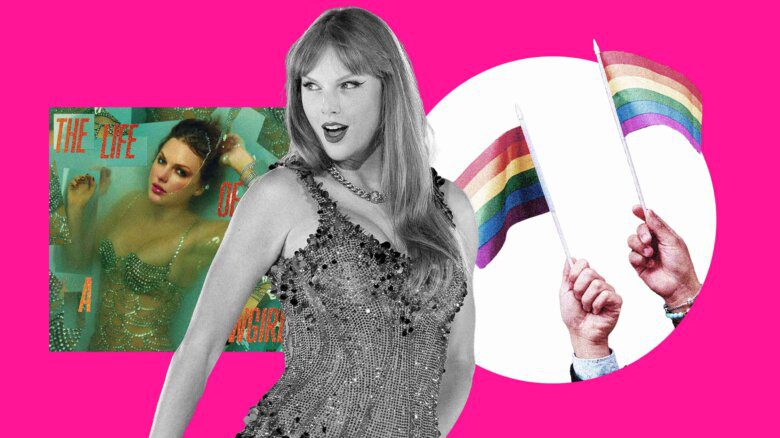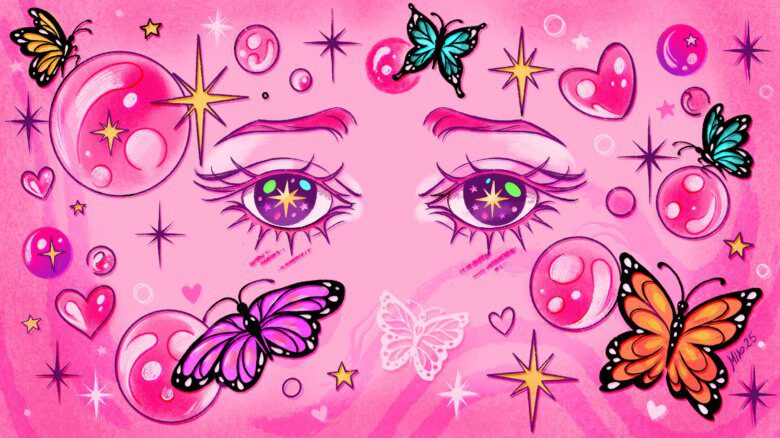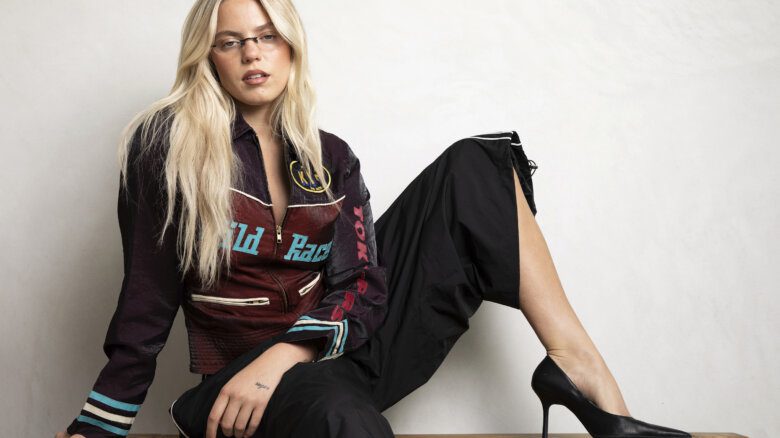Content warning: The following story addresses child sexual abuse and violence.
Tanya Tagaq blows my mind. The Juno Award and Polaris Prize winner has raised the profile of Inuit throat singing more than any other music artist. She’s released seven solo albums and has collaborated with the likes of Björk, Kronos Quartet and Buffy Sainte-Marie. In 2018, she released a novelistic memoir Split Tooth which was longlisted for the Scotiabank Giller Prize that year.
Throughout, Tagaq has always been generous and open with her audiences. She is capable of creating raw power and beauty in her art while simultaneously challenging the settler status quo. As an Indigenous listener and reader, I’m in awe of the way she grapples with some of the very dark issues affecting our communities. At the same time, there is a thrilling sense of the joy of being an Inuk woman in her work, a delicious look into her relationship to the world around her.

Her newest album Tongues, released in January by Six Shooter Records, balances the need to seek revenge against colonizers with the desire to care for and nurture her Inuit kids. While this album takes us to some difficult places, like the child sexual abuse depicted in the song “ I Forgive Me,” the whole project is infused in beautiful ethereal music that grabs and holds us as Tagaq spills truths. It is like she is whispering both threats and promises that are impossible to ignore.
I talked with Tagaq on Zoom a couple of days after Valentine’s Day about her newest album, Indigenous resistance, withholding forgiveness and nurturing.
There’s been a lot of talk about decolonizing in Indigenous communities. What are ways you refuse colonization in your own art practice?
I don’t make work worrying about how much money it’s going to make or who’s going to like it. I do work because the work appears to me as if it’s a ghost and wants me to make it into something physical.
I think as the years went by, I gained more footing in myself and stopped looking to others to see if they approved of what I was doing or not. And I’ve taken more control of the creative output of my work instead of being so—how do you say that word?—lackadaisical. So I used to be a little more like, “Oh, everyone can do what they want with it.” And now I’m a little more like, “No, the message going out needs to be what I want to say, me.” So maybe there’s that shift.
“Colonizer” is such a great song for channeling rage, but I especially love where you’re almost taunting your colonizer listeners, singing, “Oh, you’re guilty,” because I’m sure most Indigenous artists know what it’s like when your work touches a settler nerve. How do you resist being pulled into someone’s attempt to wallow in colonizer guilt?
I did a talk, and this white woman was screaming at us, holding our arms and crying and saying it wasn’t her. And she grabbed [performance artist] Laakkuluk [Williamson Bathory] and hugged her so hard that the back of Laakkuluk’s earring punctured the skin in the back of her ear. She was bleeding.
We were looking at the woman and nodding, being calm and not saying anything. How many times have I reassured people crying on me and all that stuff? That’s why I don’t care anymore. What I did on stage made you feel bad or made you feel overwhelmed? But this is what it feels like being an Inuk woman, an Indigenous woman. This is what this feels like to me. And now you’re here saying you can’t handle it, and you’re coming to me to soothe you? I’m just done. You can’t win. If you say it politely, they don’t listen. If you get mad, they don’t listen because they go, “Oh, that’s an irrational person.” If you are sad about it, they’ll kind of look at you, but go, “Oh, I guess that’s too bad,” and look the other way.
There is no winning. I thought fuck it, might as well just clobber them over the head with it because they’re either not going to hear you or dismiss you. I would rather be dismissed as someone angry than be dismissed as someone kissing their ass, you know?
I love the music video for “Colonizer”; there’s this sense of the breakdown of colonized order with these burning residential schools and the melting John A. MacDonald statue. I know as Indigenous people we’re currently outnumbered, but do you see another movement coming, like Idle No More, that will help restore Indigenous control over our people and lands?
Yeah, I truly believe that nothing can make us give up fighting for sovereignty.
I know some people in your community have tried to shame you for making work about sex. What are your feelings on negotiating making sexual art with this assumed community responsibility that Indigenous people tend to put on our artists?
There’s this really sick thing that happened with Christianity where they want to serve their god by denying their flesh. I think that is not the right way to serve the spirit world because it’s a wonderful gift to come here. We came here, we were brought here, it’s wonderful to be here. It’s wonderful to have this body. And we can best serve this spirit world by enjoying ourselves and enjoying our flesh, enjoying our bodies.
Like, it feels good to have sex. It’s healthy, it’s incredible, it’s magical making new people. And it’s also magical sharing love, or just simply physical pleasure with somebody. I don’t see anything dirty about sex, and I think it’s foolish of humans to have made it dirty.
I grew up in Nunavut, I spent a lot of time on the land alone. It’s peaceful and there’s no trees there, so being able to see all the land around you—no roads, no people, no town nearby, no hospital even nearby—just in isolation, sitting and observing all the animals and everything around you, that’s where I come to the conclusions where I can see the folly of humanity so distinctly. Animals don’t deny their bodies.
I’m thankful to be able to see the trees. I’m thankful to be able to hear sound and to have sound come to me in such a way that creates melody and song. I’m so thankful to be able to smell my husband, my child, the things around me. And to taste, and to feel, and to come with love too, or not. Just being able to run, sweat, cry—it’s all a gift. When people shame me about that, I just know I’m right.
And when I look at those people who go, “You should cover up. You shouldn’t be doing that,” I know that they want to cover up and that’s how they are comfortable. They can do it that way. I’m not saying they’re wrong for them. That’s just who they are and what they want, and that’s okay.
On Twitter in 2020, you wrote, “I’m worried that [the term] bisexual insinuates that someone is attracted to two genders only, men and women, that there are only two genders. If the term excludes transgender, that isn’t what I am.” Asking as a trans person, and since Valentine’s Day was just a couple days ago, is there any love you want to speak about trans people?
I was wondering how trans people felt about bisexuality and how to be respectful towards the trans community within that terminology. The way I think about human sexuality that is everybody’s on a, for lack of a better term, gray scale. And you can be anywhere. I wanted to ask trans people their opinion because I’m not trans. I get very happy when people transition. I’m so proud of them. They’re finding who they are and who they are meant to be, who they want to be. I just for the life of me can’t understand why anybody would bother policing somebody’s gender.
I hope that society opening up to trans people has helped people accept themselves. And I hope they know how wonderful and beautiful they are. They deserve safety and love and freedom to be themselves.
“Teeth Agape” is about defending children while talking about how particularly cruel genocide has been for children and how that affects our communities. But the song isn’t only about defending children; there’s a very clear path to seeking revenge if anything should happen. Can you talk about why revenge makes sense in this particular time?
The worst thing about those abuses is the shame that people feel for letting their children go to residential school. I have a feeling that if people had known that’s what it was, they would’ve fought to keep their kids home. If they knew what was going to be done to them, if it wasn’t a lie. This is a thing that bothers me a lot when hearing the colonial viewpoint of the world, where we “lost” and there was “strategy,” so we lost. When? People that are true to themselves and true to each other aren’t liars. And when you cast a web of lies with people that see honesty as dignity, you might have overtaken people, but it was not out of people being naive. It’s out of you being sick. And that’s important: if people had known, if it wasn’t a dirty web of lies—even in the Constitution, signing treaties—that isn’t strategy.
Strategy, done properly, assures positive outcomes for all, if you are claiming to be working in tandem. I’m incredibly disappointed at this idea that you’re supposed to lie and scheme and be the dirtiest you can be while pretending to be the best. This idea of dignity—people are so foolish. They attached it to money. You cannot buy dignity. You have to be true to yourself and make good decisions to have dignity.
In “I Forgive Me,” you’re talking about child sexual abuse, and I admire the fierceness of this song grappling with events from childhood. I’m really uncomfortable with the narrative that the moment of healing from abuse is put onto the shoulders of the survivor when they forgive the abusers. So I love the way you explicitly state you do not forgive them. What’s it like to make art around trauma?
It’s really awful. I even did not put a song on the album because it was too hard to hear. I might put it on the next one. It takes a lot of bravery because I am openly sharing my shame, and that’s very difficult. I got sick of people saying, “Forgive them. That’s the only way forward.” I started to suspect that forgiveness was a conduit to allow these things to happen again. Don’t tell people they have to forgive to find peace. You can find peace from stopping a piece of shit from molesting another kid. That’s real peace. Sitting in my shame, wallowing in it, does not sound like peace to me. Those people are [the ones] who did wrong, not me. You shouldn’t touch kids. Don’t do to them what was done to you. You know better than that. One of my best friends got incarcerated twice for kicking the shit out of molesters and rapists.
I’ve been daydreaming about making artwork that is just…. You know how they have, in the middle of the community, there’ll be this sculpture or there’ll be this nice thing to help decorate the community? Just having: don’t molest kids. Don’t touch kids. Just everywhere. Just up at the Northern Store, bulletins, walking around with a sign up and down Main Street. The less you talk about it, the more it’s going to happen.
I’m all about just openly pointing fingers. Accusations, naming people, telling what happened to you—yeah, go for it. I got you. We don’t have to live alone in this trauma. We don’t have to live alone with the shame. What people don’t understand is what you have to forgive are the symptoms of trauma. You should be understanding towards people. But when it comes to hurting others, there has to be a line. People have to have self-control.
In this last year, we’ve revealed a lot of the abuse—even murders—our children have gone through, but “Earth Monster” is such a beautiful song because it’s about loving and protecting your child. Do you want to talk about why it was so important for you to sing about caring for your daughter?
She’s 18 now. I think she was turning six when I wrote the song. Oh my goodness, I just love her. I was loving her so much that I felt I needed to put it on there.
Everything’s a fine balance. The protection wall I have around my kids is very fierce because of crazy people—like that crazy white man who Photoshopped my daughter dead on the ice. What I wouldn’t give to get my hands on that motherfucker. I’ll go to jail. I don’t give a fuck. Really, going to jail doesn’t scare me when it comes to something like that. It’s just like, “Fucking try it now. See what happens. Try taking all of our kids to residential school today.” I guess there’s a bit of that energy in there.
And this is the thing, the arc of the album, too, was important. By the end, there’s “I Forgive Me” [that] is about forgiving myself, and then “Earth Monster” is about nurturing.
It goes from anger and revenge—the “Colonizer” is accusatory. And then by the end, it goes to soothing myself, my family, everyone. You can still soothe and love while you’re fighting. You can be all things. You can embody health, healthy home, peaceful home and love, and still not think peaceful protest is enough. People are complicated and we should be looking at ourselves as a whole, who we are, good and bad. And I find, with “Earth Monster,” I’m almost sick with love for my children, lovesick.
This interview has been edited.
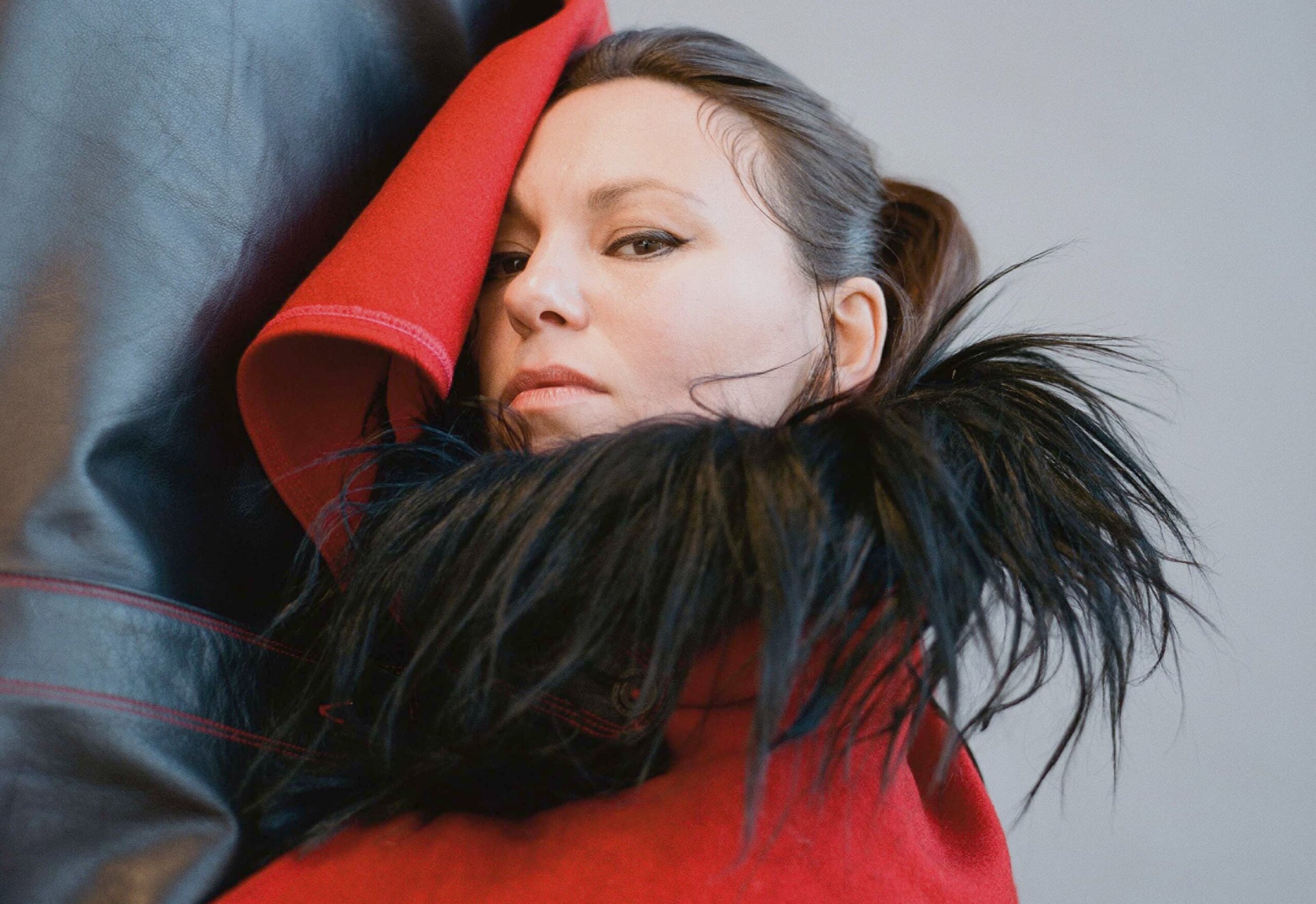
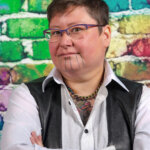
 Why you can trust Xtra
Why you can trust Xtra